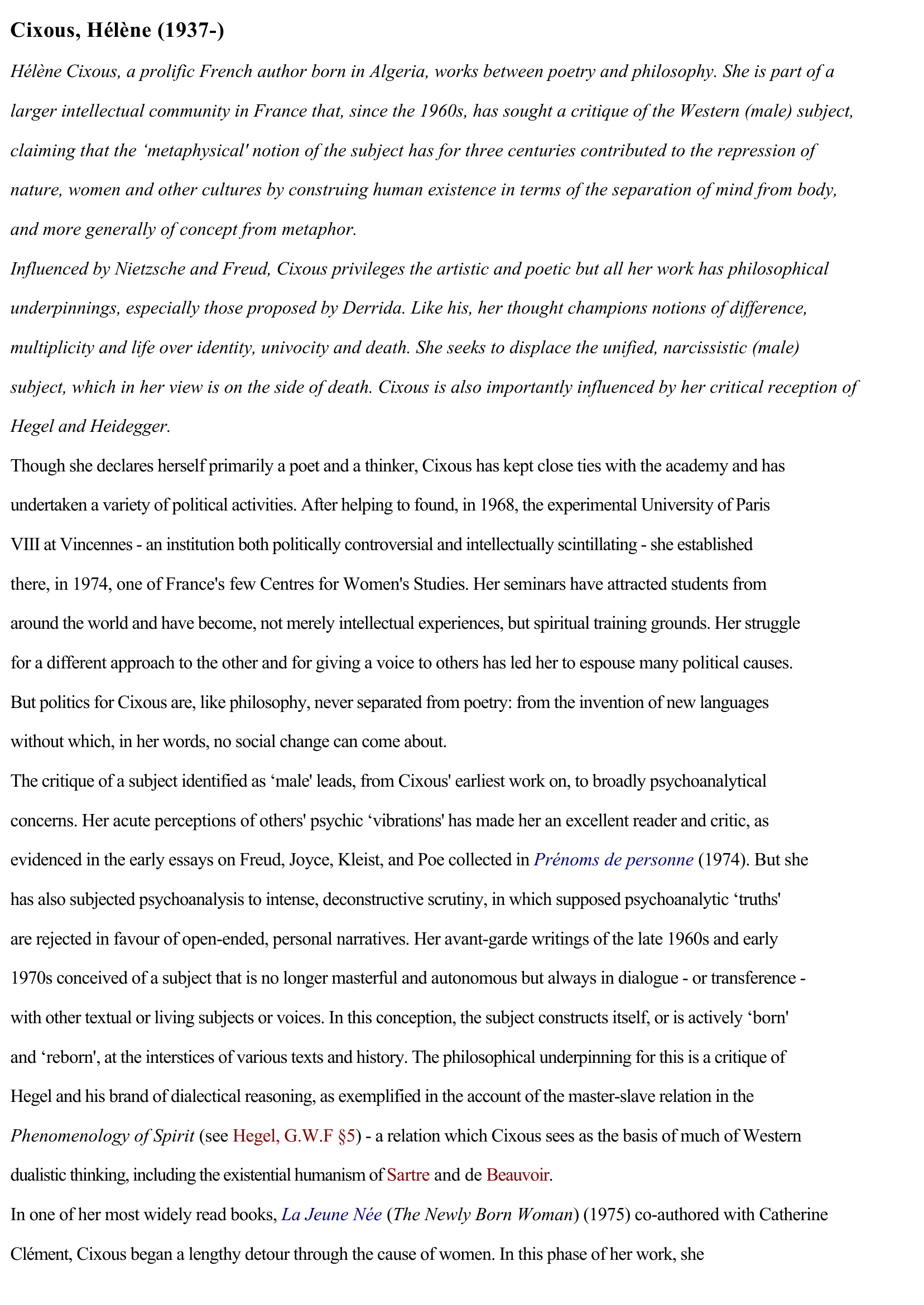CIXOUS Hélène : sa vie et son oeuvre
Publié le 21/11/2018

Extrait du document
CIXOUS Hélène (née en 1937). « Personne, à ma connaissance, n’a jamais réussi à mettre un doigt sur moi. » Boutade ou aveu? Dans tous les cas, cette phrase, extraite de Dedans (1969), donne une juste image de la personnalité et de l’œuvre d’Hélène Cixous, qui n’a cessé de dérouter ses critiques, ses éditeurs et, parfois, ses lecteurs. Née à Oran, de parents juifs — sa mère était d’origine allemande et son père d'Afrique du Nord —, Hélène Cixous a fait ses études à Alger puis, revenue en France, elle obtient l’agrégation d'anglais, enseigne et, avant de se lancer dans l’écriture romanesque, soutient une thèse sur l'Exil de Joyce ou l'Art du remplacement (1969), où elle montre comment et pourquoi le grand écrivain irlandais a choisi d’être un exilé et de mourir pour que vive « le » livre.
«
Cixous, Hélène (1937-)
Hélène Cixous, a prolific French author born in Algeria, works between poetry and philosophy.
She is part of a
larger intellectual community in France that, since the 1960s, has sought a critique of the Western (male) subject,
claiming that the ‘metaphysical' notion of the subject has for three centuries contributed to the repression of
nature, women and other cultures by construing human existence in terms of the separation of mind from body,
and more generally of concept from metaphor.
Influenced by Nietzsche and Freud, Cixous privileges the artistic and poetic but all her work has philosophical
underpinnings, especially those proposed by Derrida.
Like his, her thought champions notions of difference,
multiplicity and life over identity, univocity and death.
She seeks to displace the unified, narcissistic (male)
subject, which in her view is on the side of death.
Cixous is also importantly influenced by her critical reception of
Hegel and Heidegger.
Though she declares herself primarily a poet and a thinker, Cixous has kept close ties with the academy and has
undertaken a variety of political activities.
After helping to found, in 1968, the experimental University of Paris
VIII at Vincennes - an institution both politically controversial and intellectually scintillating - she established
there, in 1974, one of France's few Centres for Women's Studies.
Her seminars have attracted students from
around the world and have become, not merely intellectual experiences, but spiritual training grounds.
Her struggle
for a different approach to the other and for giving a voice to others has led her to espouse many political causes.
But politics for Cixous are, like philosophy, never separated from poetry: from the invention of new languages
without which, in her words, no social change can come about.
The critique of a subject identified as ‘male' leads, from Cixous' earliest work on, to broadly psychoanalytical
concerns.
Her acute perceptions of others' psychic ‘vibrations' has made her an excellent reader and critic, as
evidenced in the early essays on Freud, Joyce, Kleist, and Poe collected in Prénoms de personne (1974).
But she
has also subjected psychoanalysis to intense, deconstructive scrutiny, in which supposed psychoanalytic ‘truths'
are rejected in favour of open-ended, personal narratives.
Her avant-garde writings of the late 1960s and early
1970s conceived of a subject that is no longer masterful and autonomous but always in dialogue - or transference -
with other textual or living subjects or voices.
In this conception, the subject constructs itself, or is actively ‘born'
and ‘reborn' , at the interstices of various texts and history.
The philosophical underpinning for this is a critique of
Hegel and his brand of dialectical reasoning, as exemplified in the account of the master-slave relation in the
Phenomenology of Spirit (see Hegel, G.W.F §5 ) - a relation which Cixous sees as the basis of much of Western
dualistic thinking, including the existential humanism of Sartre and de Beauvoir .
In one of her most widely read books, La Jeune Née (The Newly Born Woman ) (1975) co-authored with Catherine
Clément , Cixous began a lengthy detour through the cause of women.
In this phase of her work, she.
»
↓↓↓ APERÇU DU DOCUMENT ↓↓↓
Liens utiles
- BONNETAIN Paul : sa vie et son oeuvre
- ZÉVACO Michel : sa vie et son oeuvre
- WEYERGANS François : sa vie et son oeuvre
- VIE DE SAINT LOUIS de Jean, sire de Joinville (résumé de l'oeuvre & analyse détaillée)
- SAINTE-BEUVE (vie et oeuvre)

































